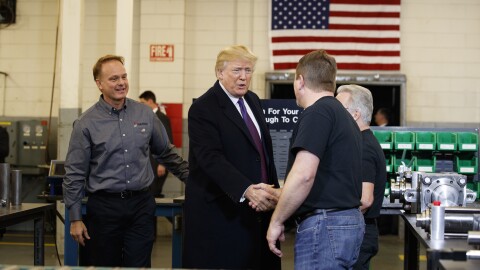It's last call for public comment on a Trump administration proposal that would give bar and restaurant owners more control over workers' tips.
The Labor Department has been asking for feedback, and already hundreds of thousands of people have weighed in.
Many say they say they're opposed to a rule that would allow restaurant owners to pocket tips for themselves.
"I think it's another example of corporate greed gone wrong," says Julie Holmes, a former waitress from Virginia. "It basically makes people feel as though they can't earn a living. Women especially. Single mothers and people who are really out here working as hard as they can to try to provide are affected by this."
The inspector general is also investigating reports that the Labor Department tried to hush up an internal analysis that found the proposed rule could cost tipped workers billions of dollars a year.
"People have a lot of feelings about this," says Heidi Shierholz, who served as chief economist for the Labor Department under former President Obama. "When the administration is trying to make it so employers can take tips, there's a lot of tipped workers out there. And people are really not happy about this."
Shierholz suggests the proposal is driven by the restaurant industry, which has long wanted more control over workers' tips.
"There's 20 percent of what a business generates, we have no ability to impact at all, traditionally," says Kurt Huffman, who runs more than two dozen restaurants in Oregon.
Huffman says if he could, he would redirect some of those tips to lower-paid cooks and dishwashers. Many restaurants already require wait-staff to share tips with busboys and hostesses, but they're not allowed to require such sharing with people who work in the kitchen.
"I think all of us see this as a way to reallocate the tips a little bit more fairly to level out the wage inequity," Huffman says.
But Shierholtz, who now works for a left-leaning think tank, the Economic Policy Institute, says there's nothing in the proposed rule that would require tips to be shared with other workers. So long as an employer pays minimum wage, he or she could use tips to reward managers, make capital improvements, or simply keep the money.
"We estimate that nearly $6 billion will be taken from workers and pocketed by employers," Shierholz says.
She was surprised when the Labor Department issued its proposal without that kind of cost-benefit analysis, which is typically included. The department said at the time it would be too speculative.
Now a report from Bloomberg says the Labor Department did crunch the numbers, but decided not to publish the results because they showed tipped workers could lose billions of dollars a year.
The Department's Inspector General is investigating the reported omission. And Democratic lawmakers say it raises "serious questions about the integrity" of the rule-making process.
"If DOL [the Department of Labor] decides to push through this rule and ignores its costs to workers or the public's concerns, there will be a real erosion of trust in the DOL's commitment to protecting workers," said Rep. Bobby Scott, D-Va., ranking Democrat on the Education and Workforce Committee.
A Labor Department spokesman said in a statement that officials do plan to include a cost-benefit analysis with their final decision on the tip rule.
Scott complains that's too late.
"It makes no sense to propose a rule and then do the research," he says. "The rule should be a product of the research."
Holmes, whose critical comment was one of many received by the Labor Department, says she hopes public opinion will help to shape any final rule.
"I really hope it does," she says. "Maybe the powers that be can understand these are real people being affected by this."
For decades before this proposal, the Labor Department had maintained that tips are the property of the workers who receive them. The restaurant industry has challenged that position and the issue could be decided by the Supreme Court.
Copyright 2021 NPR. To see more, visit https://www.npr.org. 9(MDA5NTM4MTIyMDE0MTg3NDc2MTVlZjdmNQ001))







